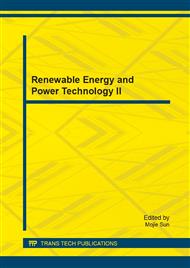[1]
R. H. Lasseter, MicroGrids, in Power Engineering Society Winter Meeting, 2002. IEEE, 2002, pp.305-308 vol. 1.
Google Scholar
[2]
M. Strelec, K. Macek, and A. Abate, Modeling and Simulation of a Microgrid as a Stochastic Hybrid System, 2012 3rd Ieee Pes Innovative Smart Grid Technologies Europe (Isgt Europe), (2012).
DOI: 10.1109/isgteurope.2012.6465655
Google Scholar
[3]
S. Chakraborty, M. D. Weiss, and M. G. Simoes, Distributed Intelligent Energy Management System for a Single-Phase High-Frequency AC Microgrid, Industrial Electronics, IEEE Transactions on, vol. 54, pp.97-109, (2007).
DOI: 10.1109/tie.2006.888766
Google Scholar
[4]
C. Chen, s. duan, T. Cai, B. Liu, and G. Hu, Smart energy management system for optimal microgrid economic operation, Renewable Power Generation, IET, vol. 5, pp.258-267, (2011).
DOI: 10.1049/iet-rpg.2010.0052
Google Scholar
[5]
P. O. Kriett and M. Salani, Optimal control of a residential microgrid, Energy, vol. 42, pp.321-330, Jun (2012).
DOI: 10.1016/j.energy.2012.03.049
Google Scholar
[6]
A. Seon-Ju, N. Soon-Ryul, C. Joon-Ho, and M. Seung-Il, Power Scheduling of Distributed Generators for Economic and Stable Operation of a Microgrid, Smart Grid, IEEE Transactions on, vol. 4, pp.398-405, (2013).
DOI: 10.1109/tsg.2012.2233773
Google Scholar
[7]
S. Mohammadi, S. Soleymani, and B. Mozafari, Scenario-based stochastic operation management of MicroGrid including Wind, Photovoltaic, Micro-Turbine, Fuel Cell and Energy Storage Devices, International Journal of Electrical Power & Energy Systems, vol. 54, pp.525-535, Jan (2014).
DOI: 10.1016/j.ijepes.2013.08.004
Google Scholar
[8]
T. Niknam, R. Azizipanah-Abarghooee, and M. R. Narimani, An efficient scenario-based stochastic programming framework for multi-objective optimal micro-grid operation, Applied Energy, vol. 99, pp.455-470, Nov (2012).
DOI: 10.1016/j.apenergy.2012.04.017
Google Scholar
[9]
W. Su, J. Wang, and J. Roh, Stochastic Energy Scheduling in Microgrids With Intermittent Renewable Energy Resources, Smart Grid, IEEE Transactions on, vol. PP, pp.1-9, (2013).
DOI: 10.1109/tsg.2013.2280645
Google Scholar
[10]
National Household Travel Survey Pre- and Post-9/11 Data Documentation. Available: National Household Travel SurveyPre- and Post-9/11 Data Documentation | Bureau of Transportation Statistics.
Google Scholar
[11]
W. Ting, Y. Qiang, B. Zhejing, and Y. Wenjun, Coordinated Energy Dispatching in Microgrid With Wind Power Generation and Plug-in Electric Vehicles, Smart Grid, IEEE Transactions on, vol. 4, pp.1453-1463, (2013).
DOI: 10.1109/tsg.2013.2268870
Google Scholar
[12]
J. Dupacova, N. Growe-Kuska, and W. Romisch, Scenario reduction in stochastic programming - An approach using probability metrics, Mathematical Programming, vol. 95, pp.493-511, Mar (2003).
DOI: 10.1007/s10107-002-0331-0
Google Scholar
[13]
E. Valsera-Naranjo, A. Sumper, R. Villafafila-Robles, and D. Martinez-Vicente, Probabilistic Method to Assess the Impact of Charging of Electric Vehicles on Distribution Grids, Energies, vol. 5, pp.1503-1531, May (2012).
DOI: 10.3390/en5051503
Google Scholar


